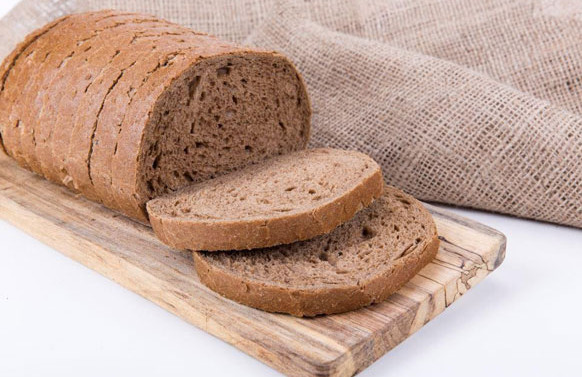Know the benefits of brown bread
Dietary fiber can be found in brown bread. It is beneficial to your health to consume a diet rich in fiber. The consumption of 25 to 30 grams of fiber per day, which comes from whole grain products, may help maintain regular bowel movements and reduce constipation risk.

Brown bread’s health benefits
Brown bread has been studied for its health benefits, and we mention the following:
Compared to refined and processed grains, brown bread may reduce blood sugar and insulin spikes by reducing rapid blood sugar and insulin levels.
In a systematic review published in the medical journal PLoS in 2007, a group of studies found that consuming whole grains, particularly whole wheat, for 6 months increased insulin sensitivity in overweight adults with high blood insulin levels. Compared to refined grains, it increases insulin levels.
People who ate a low-calorie diet that included whole grains had a lower risk of heart disease. Like whole grain bread, they lost more belly fat than those who only ate refined grains. Although whole grains contain higher fiber, vitamins, and minerals than white bread and white rice, consuming large amounts of brown bread can increase body weight, so it is recommended that you limit your consumption.
A preliminary study published in 2003 in Food Chemistry found that eating a diet containing 70 percent whole wheat flour or dry brown bread reduced cholesterol and triglyceride levels in the blood and liver. As a result, it reduces in the body. Brown bread may help reduce blood cholesterol and triglycerides, as well as reduce cholesterol absorption from food. However, more research is needed.
Brown bread’s nutritional value
Here are the nutrients in a 28 gram tablet of Arabic brown bread or whole wheat bread:
| Nutrient | Nutritional Value |
| now | 8.57 ml |
| calories | 73.4 calories |
| carbohydrates | 15.6 grams |
| sugars | 0.804 grams |
| Dietary fiber | 1.71 grams |
| Protein | 2.74 grams |
| Fats | 0.479 grams |
| Calcium | 4.2 mg |
| iron | 0.857 mg |
| magnesium | 19.3 mg |
| phosphorus | 50.4 mg |
| potassium | 47.6 mg |
| sodium | 118 mg |
| Zinc | 0.426 mg |
| copper | 0.081 mg |
| Manganese | 0.487 mg |
| Selenium | 12.3 micrograms |
| Vitamin B1 | 0.095 mg |
| Vitamin B2 | 0.022 mg |
| Vitamin B3 | 0.795 mg |
| Vitamin B5 | 0.233 mg |
| Vitamin B6 | 0.074 mg |
| folate | 9.8 micrograms |
| Colleen | 7.42 mg |
| beta carotene | 1.12 micrograms |
| Vitamin E | 0.171 mg |
| Vitamin K | 0.392 micrograms |
The concentration of phytic acid in brown bread increases in the bran, which may prevent the absorption of some minerals. Seeds can be sprouted, fermented, and soaked to reduce the amount of acids, such as zinc and iron.
We mention some groups that should be careful when eating brown bread:
Those suffering from chronic kidney disease cannot excrete excess sodium, potassium, and phosphorus relative to the body’s needs, which may lead to high blood levels of these minerals. The more bran and whole grains in the bread, the higher its potassium and phosphorus content, so these people are often advised to eat white bread instead of brown.
Wheat allergy sufferers: because it causes allergic reactions minutes after eating wheat. Sneezing, wheezing, and itching that require medical attention.
Gluten-sensitive individuals may experience some symptoms. The symptoms may include diarrhea, bloating, muscle cramps, and nausea. There is no examination to diagnose wheat allergy, which usually occurs hours after eating wheat.
Celiac disease: a condition in which the intestinal membrane is damaged by gluten and can’t absorb it. A doctor should be consulted in this case.
Brown bread: how to store it
Brown bread should be stored in the refrigerator or freezer. The natural oils in flour, especially whole wheat flour, oxidize when exposed to air, especially at room temperature, leading to rancidity and spoilage.










